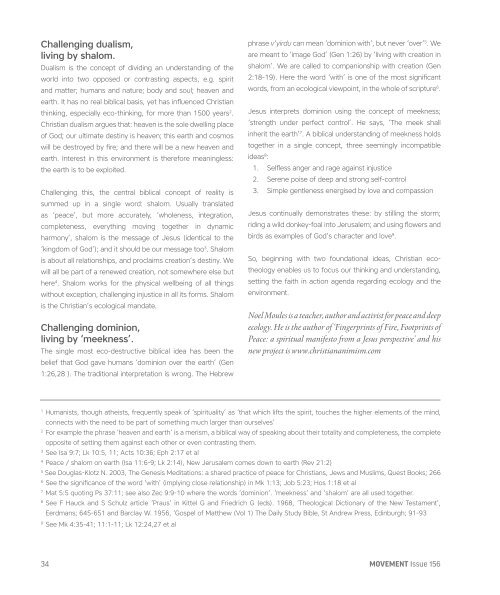Movement Magazine Issue 156
The Student Christian Movement's magazine.
The Student Christian Movement's magazine.
Create successful ePaper yourself
Turn your PDF publications into a flip-book with our unique Google optimized e-Paper software.
Challenging dualism,<br />
living by shalom.<br />
Dualism is the concept of dividing an understanding of the<br />
world into two opposed or contrasting aspects, e.g. spirit<br />
and matter; humans and nature; body and soul; heaven and<br />
earth. It has no real biblical basis, yet has influenced Christian<br />
thinking, especially eco-thinking, for more than 1500 years 2 .<br />
Christian dualism argues that: heaven is the sole dwelling place<br />
of God; our ultimate destiny is heaven; this earth and cosmos<br />
will be destroyed by fire; and there will be a new heaven and<br />
earth. Interest in this environment is therefore meaningless:<br />
the earth is to be exploited.<br />
Challenging this, the central biblical concept of reality is<br />
summed up in a single word: shalom. Usually translated<br />
as ‘peace’, but more accurately, ‘wholeness, integration,<br />
completeness, everything moving together in dynamic<br />
harmony’, shalom is the message of Jesus (identical to the<br />
‘kingdom of God’); and it should be our message too 3 . Shalom<br />
is about all relationships, and proclaims creation’s destiny. We<br />
will all be part of a renewed creation, not somewhere else but<br />
here 4 . Shalom works for the physical wellbeing of all things<br />
without exception, challenging injustice in all its forms. Shalom<br />
is the Christian’s ecological mandate.<br />
Challenging dominion,<br />
living by ‘meekness’.<br />
The single most eco-destructive biblical idea has been the<br />
belief that God gave humans ‘dominion over the earth’ (Gen<br />
1:26,28 ). The traditional interpretation is wrong. The Hebrew<br />
1<br />
Humanists, though atheists, frequently speak of ‘spirituality’ as ‘that which lifts the spirit, touches the higher elements of the mind,<br />
connects with the need to be part of something much larger than ourselves’<br />
2<br />
For example the phrase ‘heaven and earth’ is a merism, a biblical way of speaking about their totality and completeness, the complete<br />
opposite of setting them against each other or even contrasting them.<br />
3<br />
See Isa 9:7; Lk 10:5, 11; Acts 10:36; Eph 2:17 et al<br />
4<br />
Peace / shalom on earth (Isa 11:6-9; Lk 2:14), New Jerusalem comes down to earth (Rev 21:2)<br />
5<br />
See Douglas-Klotz N. 2003, The Genesis Meditations: a shared practice of peace for Christians, Jews and Muslims, Quest Books; 266<br />
6<br />
See the significance of the word ‘with’ (implying close relationship) in Mk 1:13; Job 5:23; Hos 1:18 et al<br />
7<br />
Mat 5:5 quoting Ps 37:11; see also Zec 9:9-10 where the words ‘dominion’. ‘meekness’ and ‘shalom’ are all used together.<br />
8<br />
See F Hauck and S Schulz article ‘Praus’ in Kittel G and Friedrich G (eds). 1968, ‘Theological Dictionary of the New Testament’,<br />
Eerdmans; 645-651 and Barclay W. 1956, ‘Gospel of Matthew (Vol 1) The Daily Study Bible, St Andrew Press, Edinburgh; 91-93<br />
9<br />
See Mk 4:35-41; 11:1-11; Lk 12:24,27 et al<br />
phrase v’yirdu can mean ‘dominion with’, but never ‘over’ 5 . We<br />
are meant to ‘image God’ (Gen 1:26) by ‘living with creation in<br />
shalom’. We are called to companionship with creation (Gen<br />
2:18-19). Here the word ‘with’ is one of the most significant<br />
words, from an ecological viewpoint, in the whole of scripture 6 .<br />
Jesus interprets dominion using the concept of meekness;<br />
‘strength under perfect control’. He says, ‘The meek shall<br />
inherit the earth’ 7 . A biblical understanding of meekness holds<br />
together in a single concept, three seemingly incompatible<br />
ideas 8 :<br />
1. Selfless anger and rage against injustice<br />
2. Serene poise of deep and strong self-control<br />
3. Simple gentleness energised by love and compassion<br />
Jesus continually demonstrates these: by stilling the storm;<br />
riding a wild donkey-foal into Jerusalem; and using flowers and<br />
birds as examples of God’s character and love 9 .<br />
So, beginning with two foundational ideas, Christian ecotheology<br />
enables us to focus our thinking and understanding,<br />
setting the faith in action agenda regarding ecology and the<br />
environment.<br />
Noel Moules is a teacher, author and activist for peace and deep<br />
ecology. He is the author of ‘Fingerprints of Fire, Footprints of<br />
Peace: a spiritual manifesto from a Jesus perspective’ and his<br />
new project is www.christiananimism.com<br />
TIME TO BE<br />
CREATURE KIND?<br />
Christianity has a bad name among those<br />
campaigning for animal rights. In Peter<br />
Singer’s 1975 landmark book Animal<br />
Liberation, he complained that Christianity<br />
problematically united Greek and Jewish<br />
ideas about animals and spread the idea that<br />
only human life mattered. Many Christians<br />
seem happy to take Singer’s word for this,<br />
believing that their faith gives them no<br />
reason to be concerned for animals.<br />
That wasn’t the view of the 180 people<br />
who gathered in London this past March<br />
In the nineteenth<br />
century British<br />
Christians, together<br />
with a prominent Jew,<br />
lobbied successfully<br />
for the first legislation<br />
against cruelty<br />
towards animals, set<br />
up the organisation<br />
that became the<br />
RSPCA.<br />
for a conference entitled ‘Is Christianity<br />
Good News for Animals?’, in what may<br />
well be the biggest gathering on this topic<br />
since the late nineteenth century. At the<br />
conference I argued that many Christians<br />
are concerned about animals, but their<br />
concern is disenfranchised: their churches<br />
don’t help them understand why they<br />
should be concerned about animals, leaving<br />
a gap between their faith and their love of<br />
animals.<br />
It’s odd that people don’t naturally think<br />
about the connection between Christianity<br />
and animals, because in the nineteenth<br />
century British Christians, together with<br />
a prominent Jew, lobbied successfully for<br />
the first legislation against cruelty towards<br />
animals, set up the organisation that<br />
34 MOVEMENT <strong>Issue</strong> <strong>156</strong> MOVEMENT <strong>Issue</strong> <strong>156</strong><br />
35




